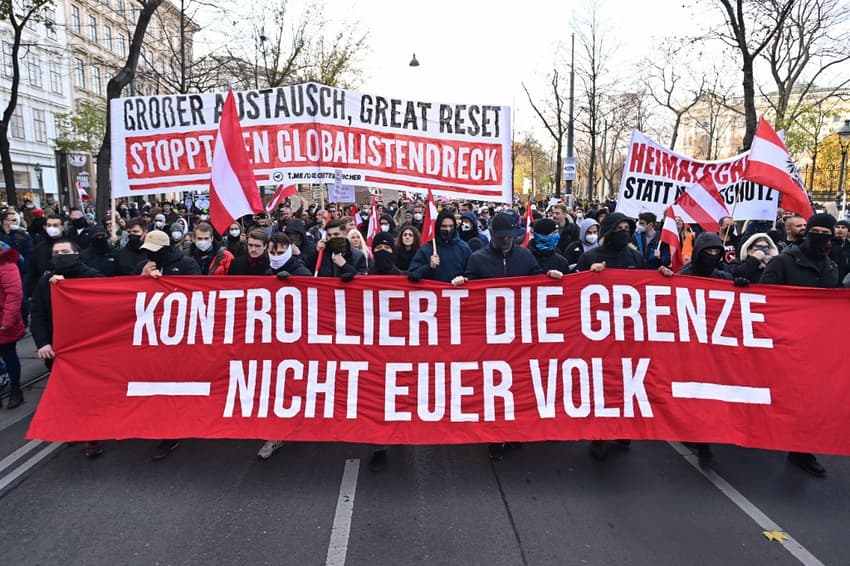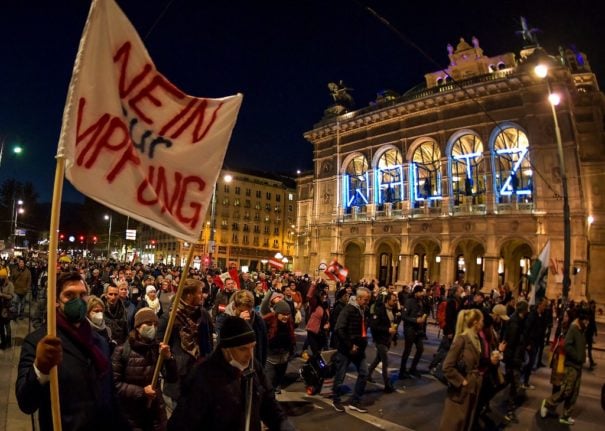What are the biggest threats facing Austria this year?

Blackouts, terrorism, conspiracy theorists and the far-right. What do the Austrian military experts consider to be the most significant threats to the country in 2023?
Austria lacks the instruments to identify crises at an early stage, assess risks and develop options for actions, according to the country's recently published "Risk Assessment 2023".
Every year, the Austrian Armed Forces evaluate possible risks the country might face, the challenges it needs to overcome and the overall picture of threats. With Russia's invasion of Ukraine, it became clear once again that the limits of Austria's neutrality would be tested, according to military experts.
"The war in and around Europe also makes it clear that a well-positioned national defence is of existential importance for a neutral state. Moreover, conventional warfare has regained importance in addition to hybrid threats. Therefore, there is a need for a return to the military protection of Austrian sovereignty against conventionally acting forces", said Defence Minister Klaudia Tanner in a press statement.
READ ALSO: EXPLAINED: Why isn't Austria in NATO?
According to her, "comprehensive national defence, which has constitutional status, must regain importance as a core task of the state and be further developed in line with the new challenges".
The threats and risks facing Austria
The Armed Forces have found that the ongoing war in Ukraine was the greatest threat to Austria and Europe.
They added that "an increase in migration, further Russian confrontation with the EU, a worsening of the energy crisis, the disruption of supply chains, stagflation and an unforeseeable escalation of the war" are other threats directly connected to the conflict.
The world has become more unstable, the military said. Five years ago, it had identified 25 threats in its risk analysis. Now, there were 73 threats analysed. "For the first time since the Federal Ministry of Defence began drawing up its risk assessment, almost all military risks for Austria have increased significantly", according to the report.
According to the report, "missile attacks on Europe cannot be ruled out", given the geo-strategic situation. Because of that, the Armed Forces should further develop their ground-based air defence capabilities and the ability to combat aircraft, drones, and cruise missiles.
On the other hand, the military found that the use of weapons of mass destruction, including nuclear, against Austria is unlikely.

Demonstrators pass the State Opera during a rally held by Austria's far-right Freedom Party FPOe against the measures taken to curb the coronavirus (Covid-19) pandemic, at Maria Theresien Platz square in Vienna, Austria on November 20, 2021. (Photo by JOE KLAMAR / AFP)
The threat of terrorism
The report did bring some good news, as the authorities stated that the threat of jihadism terrorism has diminished.
"While jihadist terrorism was the main threat ten years ago, today's picture is far more complex. However, the good news is that the threat from jihadism has decreased, which is related to the successful fight against the so-called Islamic State (IS)", it said.
However, the report added that there is now a threat from so-called "state resisters", far-right groups created and grown mainly in the wake of the pandemic that is directed against the state and its institutions.
READ ALSO: ENERGY: How Austria has drastically reduced imports of Russian gas
The authorities said these groups need to be watched closely for two main reasons. First, their narratives are "highly influenced by the so-called conspiracy theories".
"From their point of view, all state measures are a plot by "global elites" to end freedom and democracy", they said.
Additionally, the movement is infiltrated by right-wing extremists, the military added. "In both Germany and Austria, far-right groups recognised the movement's enormous mobilisation potential relatively early on and have since tried to use it for their own purposes".
The experts said that even though the movement lost its following after most of the Covid measures ended, there are signs that a hard core was radicalised beyond the pandemic. According to them, the same groups and Telegram channels that spread disinformation about health measures now speak of the war in Ukraine and the energy crisis.
READ ALSO: Why is support for Austria's far-right FPÖ rising?
"Given the current economic situation, it is not only conceivable but probable that a radicalised state-refusal movement will regain popularity and provoke an increasingly aggressive confrontation with the state", they added.
What about blackout risks?
The topics of power outages and blackouts have been the subject of public discussion - and fear-mongering - for several years. However, from the point of view of technical experts, a blackout is unlikely. This is because the continental European system is seen as very stable.
READ ALSO: Reader question: What are the chances of blackouts in Austria?
At the same time, though, the war in Ukraine has highlighted the need to diversify the supply of gas and fossil fuels in general and expand the use of renewable energy sources.
'Challenges in and from cyberspace'
Austria's report specially analysed virtual threats, saying that due to rapid digitalisation, "our society and the military are becoming increasingly interwoven with the virtual world". The experts defended a need for Europe to have its own assets in terms of hardware and software to become less dependent on the Asian and American markets.
"In addition to the EU's own chip production activities, a European operating system with high-security standards would be highly desirable", they said.
Comments
See Also
Austria lacks the instruments to identify crises at an early stage, assess risks and develop options for actions, according to the country's recently published "Risk Assessment 2023".
Every year, the Austrian Armed Forces evaluate possible risks the country might face, the challenges it needs to overcome and the overall picture of threats. With Russia's invasion of Ukraine, it became clear once again that the limits of Austria's neutrality would be tested, according to military experts.
"The war in and around Europe also makes it clear that a well-positioned national defence is of existential importance for a neutral state. Moreover, conventional warfare has regained importance in addition to hybrid threats. Therefore, there is a need for a return to the military protection of Austrian sovereignty against conventionally acting forces", said Defence Minister Klaudia Tanner in a press statement.
READ ALSO: EXPLAINED: Why isn't Austria in NATO?
According to her, "comprehensive national defence, which has constitutional status, must regain importance as a core task of the state and be further developed in line with the new challenges".
The threats and risks facing Austria
The Armed Forces have found that the ongoing war in Ukraine was the greatest threat to Austria and Europe.
They added that "an increase in migration, further Russian confrontation with the EU, a worsening of the energy crisis, the disruption of supply chains, stagflation and an unforeseeable escalation of the war" are other threats directly connected to the conflict.
The world has become more unstable, the military said. Five years ago, it had identified 25 threats in its risk analysis. Now, there were 73 threats analysed. "For the first time since the Federal Ministry of Defence began drawing up its risk assessment, almost all military risks for Austria have increased significantly", according to the report.
According to the report, "missile attacks on Europe cannot be ruled out", given the geo-strategic situation. Because of that, the Armed Forces should further develop their ground-based air defence capabilities and the ability to combat aircraft, drones, and cruise missiles.
On the other hand, the military found that the use of weapons of mass destruction, including nuclear, against Austria is unlikely.

The threat of terrorism
The report did bring some good news, as the authorities stated that the threat of jihadism terrorism has diminished.
"While jihadist terrorism was the main threat ten years ago, today's picture is far more complex. However, the good news is that the threat from jihadism has decreased, which is related to the successful fight against the so-called Islamic State (IS)", it said.
However, the report added that there is now a threat from so-called "state resisters", far-right groups created and grown mainly in the wake of the pandemic that is directed against the state and its institutions.
READ ALSO: ENERGY: How Austria has drastically reduced imports of Russian gas
The authorities said these groups need to be watched closely for two main reasons. First, their narratives are "highly influenced by the so-called conspiracy theories".
"From their point of view, all state measures are a plot by "global elites" to end freedom and democracy", they said.
Additionally, the movement is infiltrated by right-wing extremists, the military added. "In both Germany and Austria, far-right groups recognised the movement's enormous mobilisation potential relatively early on and have since tried to use it for their own purposes".
The experts said that even though the movement lost its following after most of the Covid measures ended, there are signs that a hard core was radicalised beyond the pandemic. According to them, the same groups and Telegram channels that spread disinformation about health measures now speak of the war in Ukraine and the energy crisis.
READ ALSO: Why is support for Austria's far-right FPÖ rising?
"Given the current economic situation, it is not only conceivable but probable that a radicalised state-refusal movement will regain popularity and provoke an increasingly aggressive confrontation with the state", they added.
What about blackout risks?
The topics of power outages and blackouts have been the subject of public discussion - and fear-mongering - for several years. However, from the point of view of technical experts, a blackout is unlikely. This is because the continental European system is seen as very stable.
READ ALSO: Reader question: What are the chances of blackouts in Austria?
At the same time, though, the war in Ukraine has highlighted the need to diversify the supply of gas and fossil fuels in general and expand the use of renewable energy sources.
'Challenges in and from cyberspace'
Austria's report specially analysed virtual threats, saying that due to rapid digitalisation, "our society and the military are becoming increasingly interwoven with the virtual world". The experts defended a need for Europe to have its own assets in terms of hardware and software to become less dependent on the Asian and American markets.
"In addition to the EU's own chip production activities, a European operating system with high-security standards would be highly desirable", they said.
Join the conversation in our comments section below. Share your own views and experience and if you have a question or suggestion for our journalists then email us at [email protected].
Please keep comments civil, constructive and on topic – and make sure to read our terms of use before getting involved.
Please log in here to leave a comment.